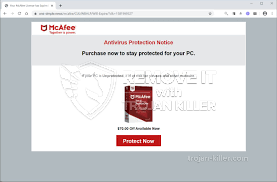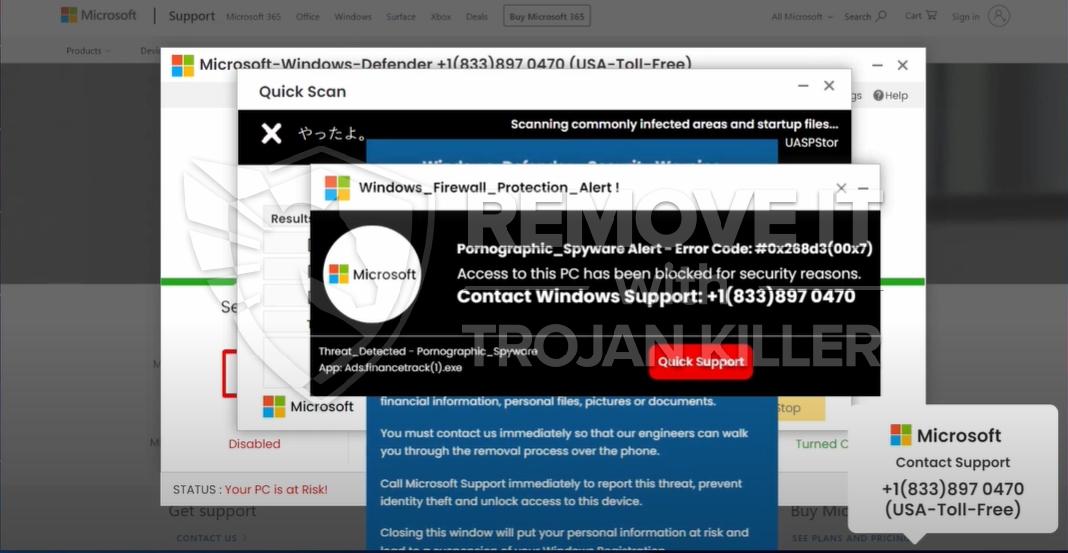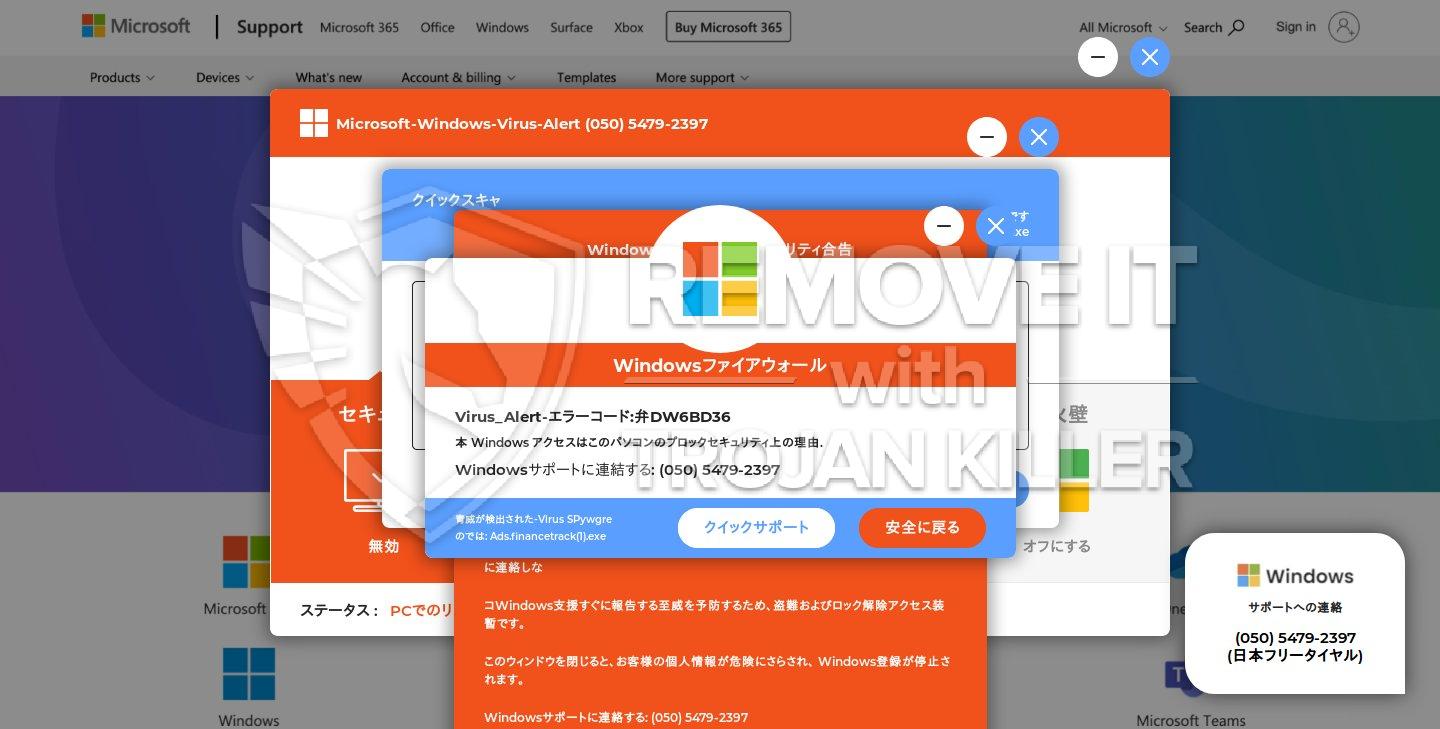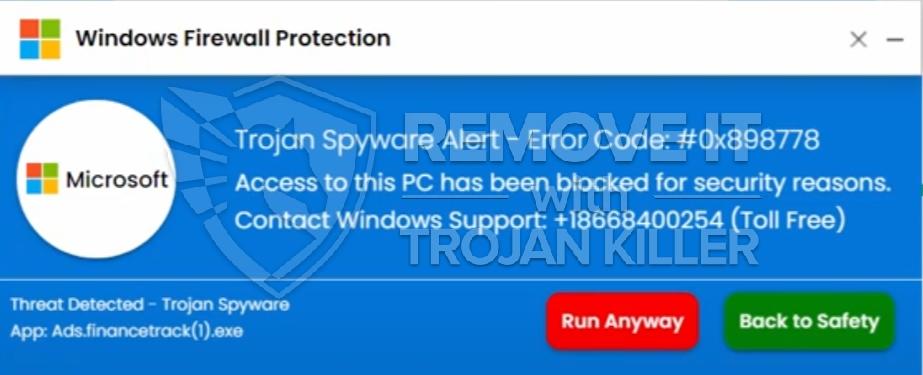“Code #007d3Cx0d” is a truly scary message some users have seen to attack their internet browsers. These pop-ups are not associated with Microsoft or Windows, despite the fact that they might appear to be legit for some people. The intent of “Code #007d3Cx0d” pop-ups is not to help you boost the PC. Rather, the sole goal of this fraud is to force you into downloading and install rogue security applications instead, which might ruin the system totally.

Usually antivirus software is intended to remove viruses, rootkits and other infection in your system. But they are oftenly ineffective when you are bombed with a huge amount of advertisment and pop-ups, and malicious software… When standard anti-virus software either fails to detect them or fails to effectively eliminate them Antimalware Software will be effective in this field. We are good in doing this and we are proud of our mission to let you breathe freely surfing the Internet!
GridinSoft Anti-Malware is designed specifically to disable/remove Malware without the user having to manually edit system files or the Registry. The program also removes the additional system modifications some malware carries out which are ignored by most antivirus scanners.
BESIDES, it is easy to choose a good antimalware solution according your needs using our mini-guide.
Follow the steps in the slider explaining how to use GridinSoft Anti-Malware.
- Step 1. Download GridinSoft Anti-Malware. Click on its installer in the left-bottom section of your browser.
- Step 2. Allow changes to be made via User Account Control.
- Step 3. Click on “Install” to install the program.
- Step 4. Wait until the program is fully installed into your PC.
- Step 5. Click on “Finish“.
- Step 6. Run the program. Wait until scanning is completed and all malware is detected.
- Step 7. Click on “Clean Now“.
- Step 8. Select the license type and purchase the program. Remove all identified threats with purchased version of the software.
- Step 9. Shut down all your browsers. In GridinSoft Anti-Malware, click on “Tools“, then select “Reset browsers settings” option.
- Step 10. Select browsers you want to be automatically reset and appropriate reset options, then click on “Reset“.
- Step 11. Click on “Protect“. Make sure that Internet Security mode is enabled.
Tips to remove “Code #007d3Cx0d” pop-up manually from your PC.
STEP 1. Uninstalling unwanted software regularly (via the Control Panel).
In order to get rid of “Code #007d3Cx0d” pop-up from your system, locate the “Uninstall a program” feature in your PC depending on the version of your Windows operating system:
- For Windows 8/10: Right-click on Start – Quick Access Menu – Control Panel – Uninstall a program. You may check the list of applications and utilities installed on your PC. Find suspicious software that may cause “Code #007d3Cx0d” pop-up problem, then right-click on it and select “Uninstall“.
- For Windows 7: Click on Start – Control Panel – Uninstall a program. Check the list of programs and software available in your PC that might cause “Code #007d3Cx0d” pop-up problem, then press “Uninstall“.
- For Windows XP: Click on Start – Control Panel – Add/Remove Programs. You will find the list of available programs in your PC. Right-click on suspicious software that may cause “Code #007d3Cx0d” pop-up problem and select “Uninstall“.
Here is the detailed process with screenshots on how to uninstall unwanted software manually.
- Right-click on Windows logo in the bottom-left section of the screen, then select “Control Panel“:
- In “Programs” section, click on “Uninstall a program“:
- Right-click on specific unwanted application, the select “Uninstall“:
- Right-click on Windows taskbar, then select “Task Manager“:
- Select specific task related to unwanted program, then right-click on it and choose the option “End Task“:
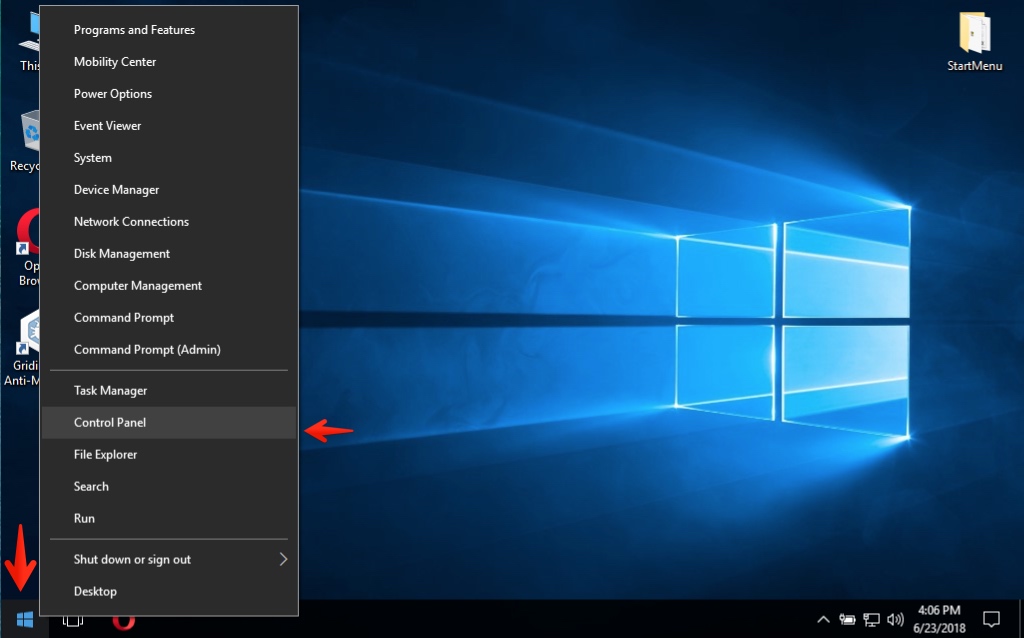
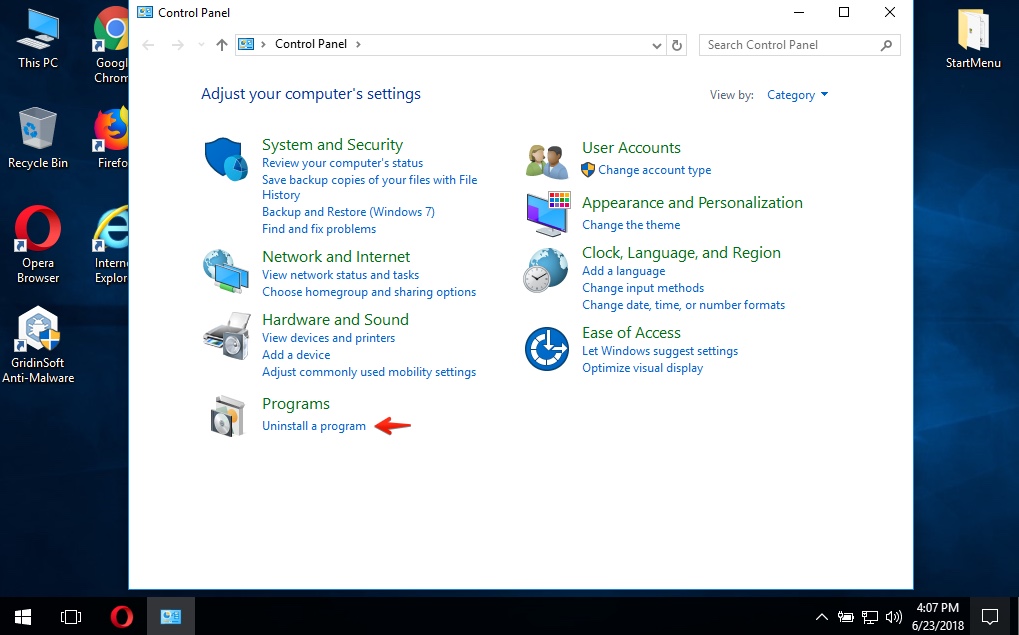
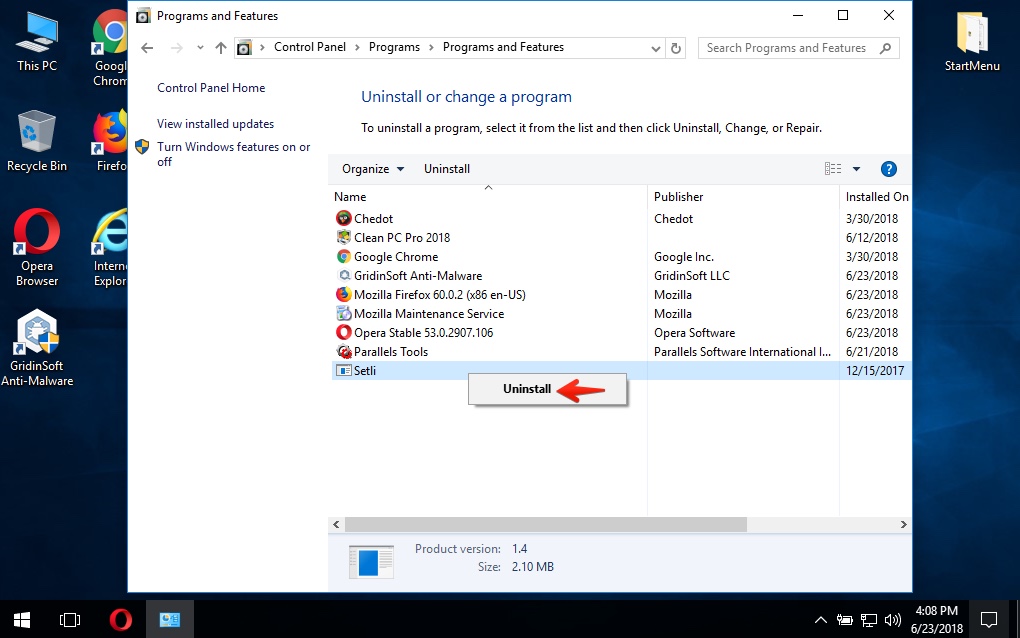
Warning! Some unwanted programs may be active (running) while you attempt to uninstall them. It might be necessary for you to end their task via the Task Manager application. Here is how you can do that:
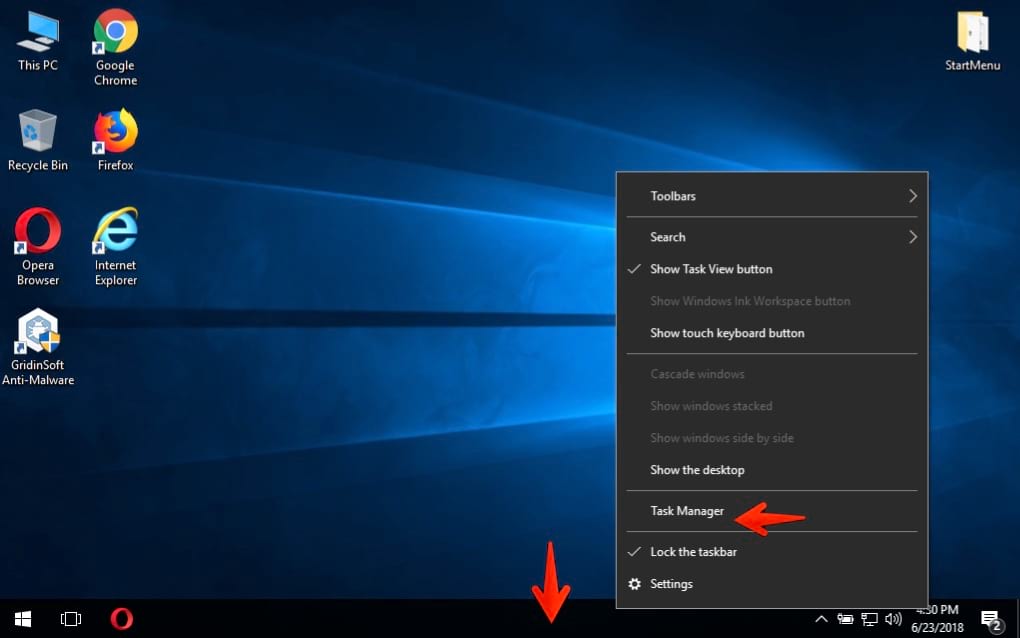
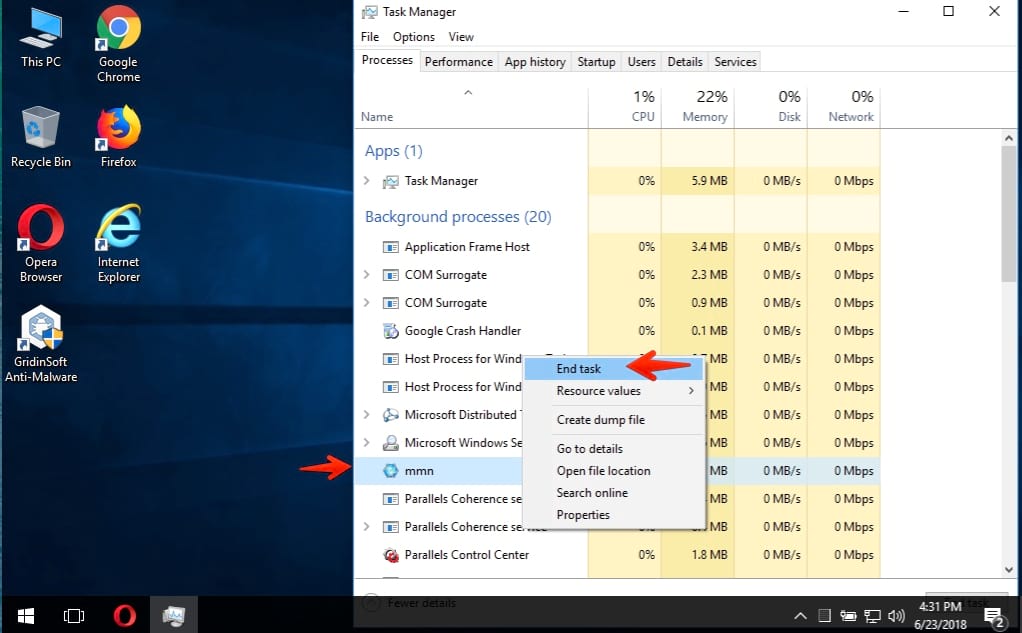
Warning! Manual malware removal as described above is often a very time-consuming undertaking. It requires a lot of technical skills and does not guarantee absolute repair of your system. We recommend you to select our fully automatic solution to fix your PC on a professional basis.
STEP 2. Fixing your browser home page and search engine settings.
Instructions to fix Google Chrome home page and search engine settings manually.
- Click on Google Chrome menu in the form of three vertical dots, then select “Settings“:
- Scroll down through Google Chrome Settings until you reach “On Startup” section. Select “Open a specific page or set pages“. Find suspicious unwanted home page, then clock on “Remove“:
- In Google Chrome Settings find “Search Engine” section. Select your preferred search engine to be enabled if your search settings are messed up (amended) by adware or browser hijacker:
- Click on “Manage search engines“.
- Find specific search engine that you do not want to be your default one, then click on “Remove from list“:
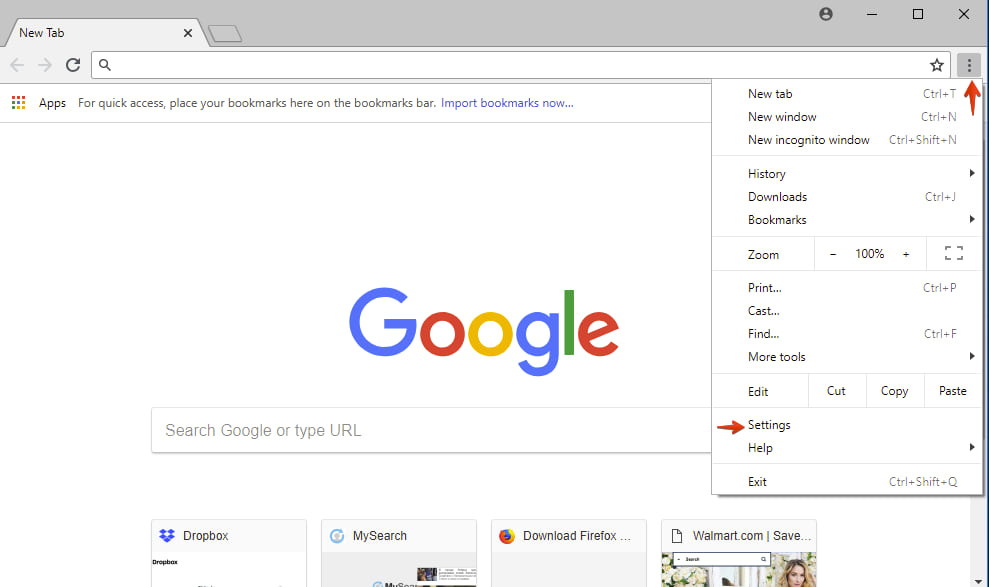
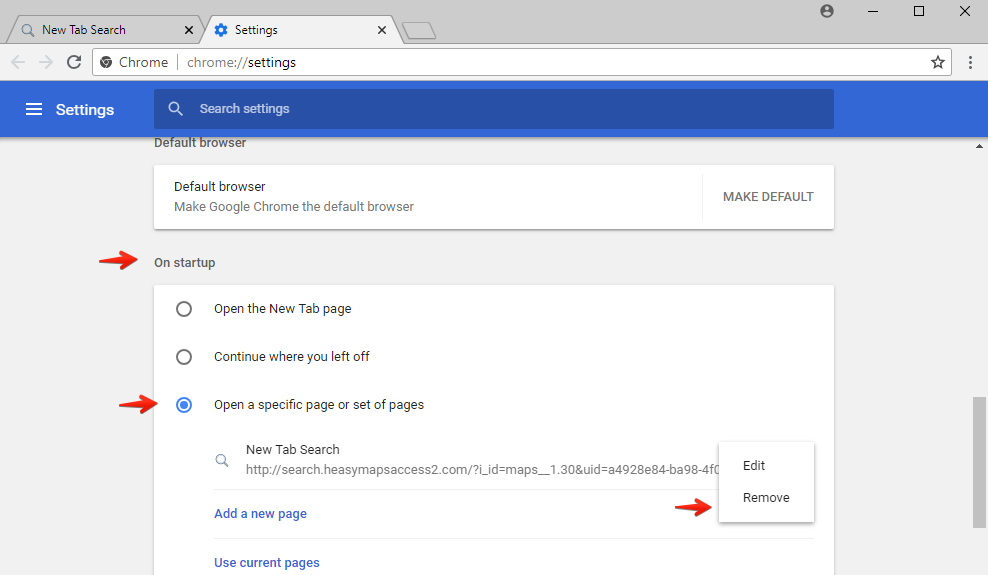
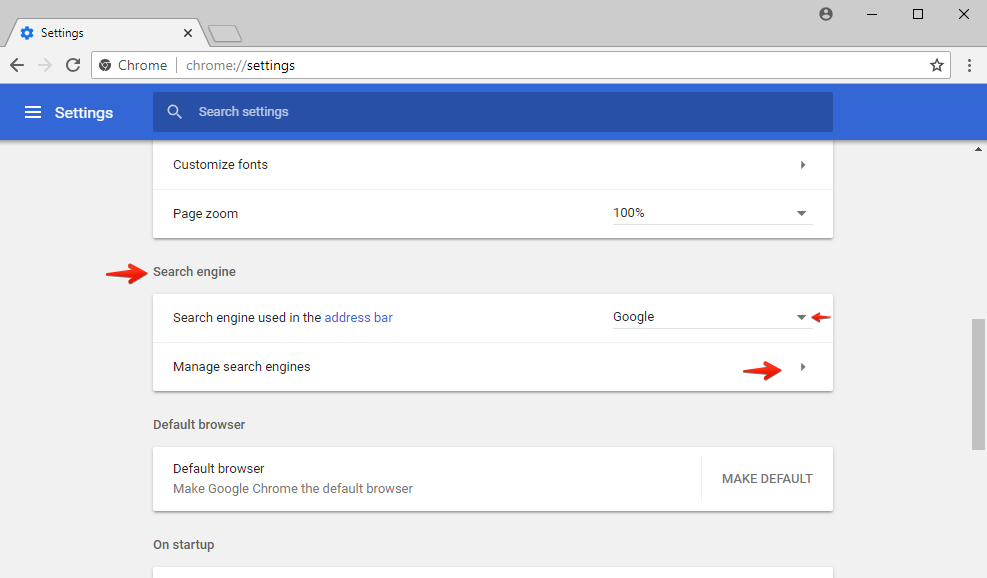
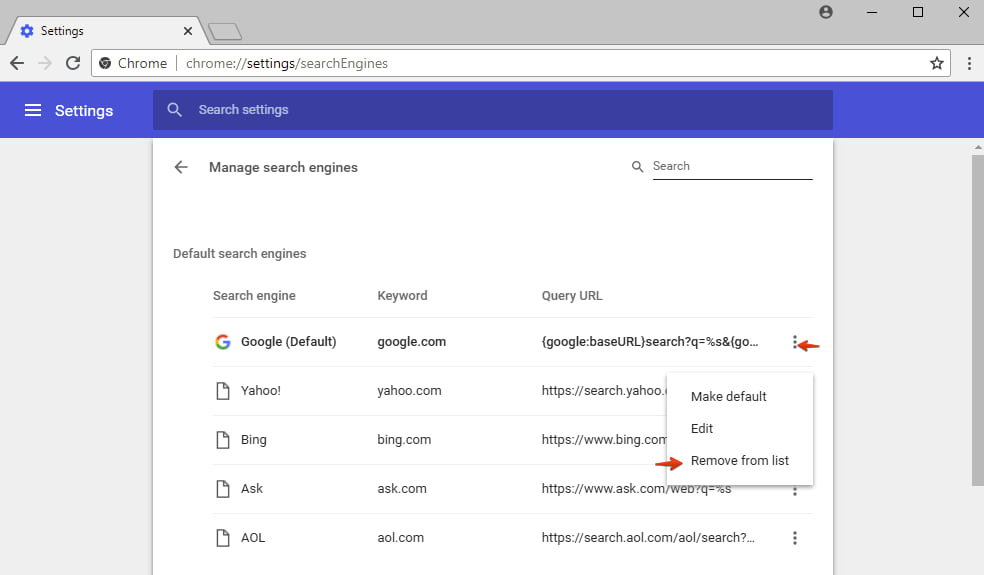
Instructions to restore Mozilla Firefox home page and search engine settings manually.
- In Mozilla Firefox, click on its menu in the form of three horizontal lines, then select “Options“:
- In “General” section, check home page settings. Remove unwanted parameters, or click on “Restore to Default“:
- In the “Search” section of Mozilla Firefox, select your preferred search engine:
- You may as well remove unwanted search engine completely from Mozilla Firefox by clicking on the “Remove” button next to it:
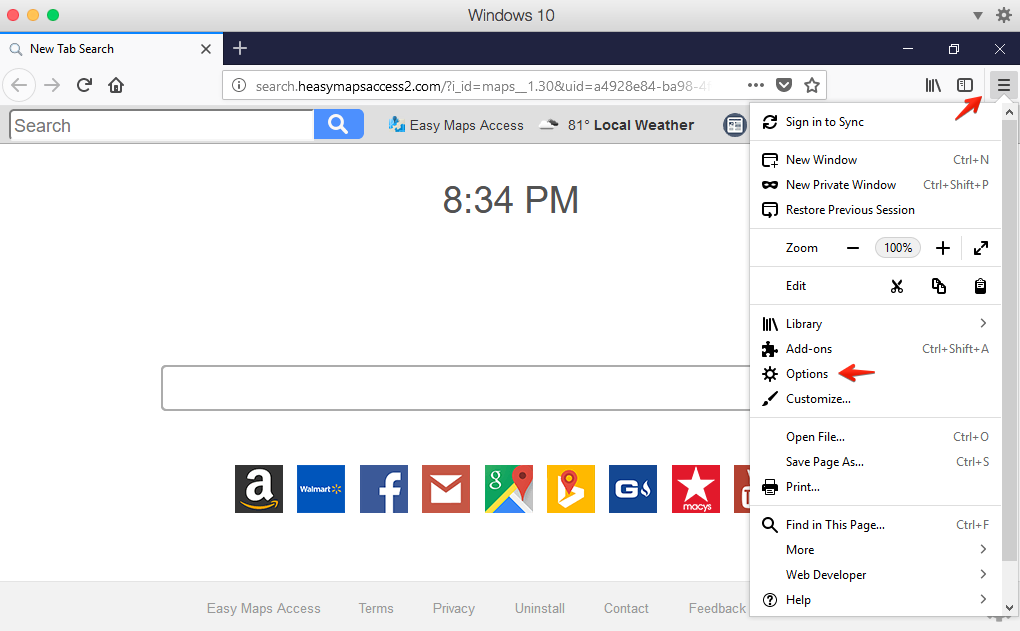
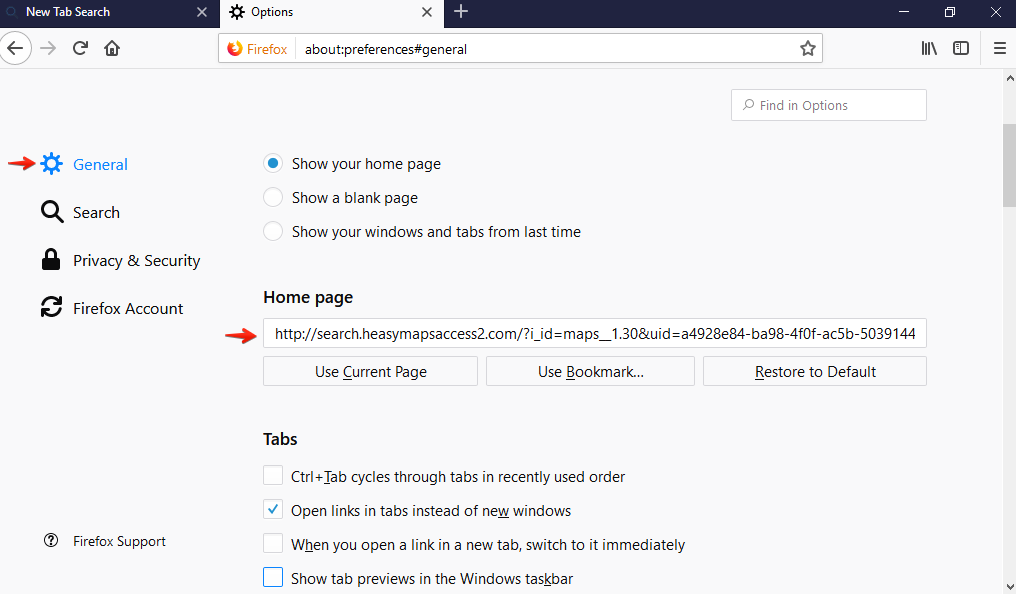
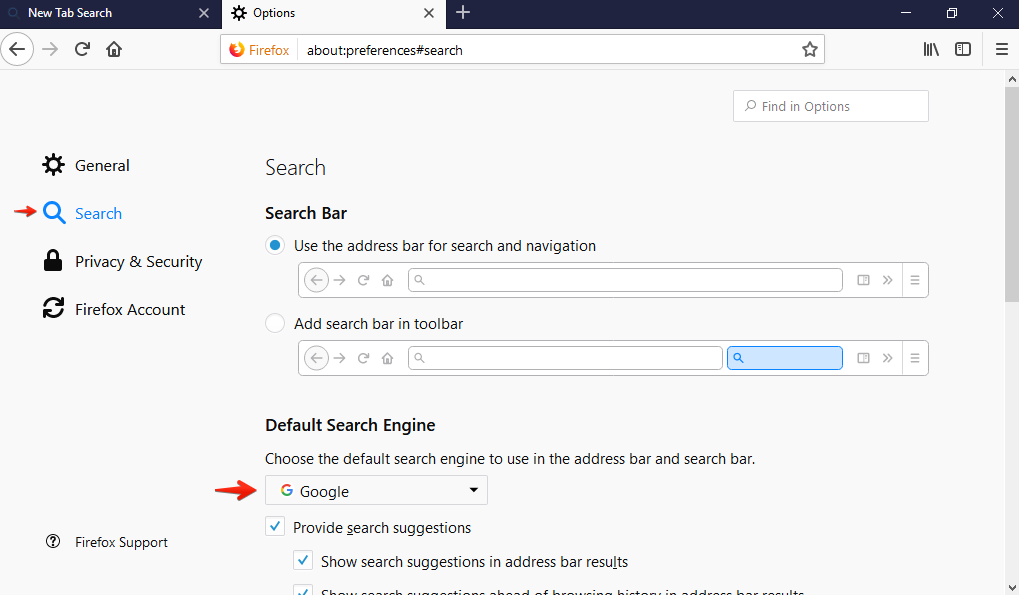
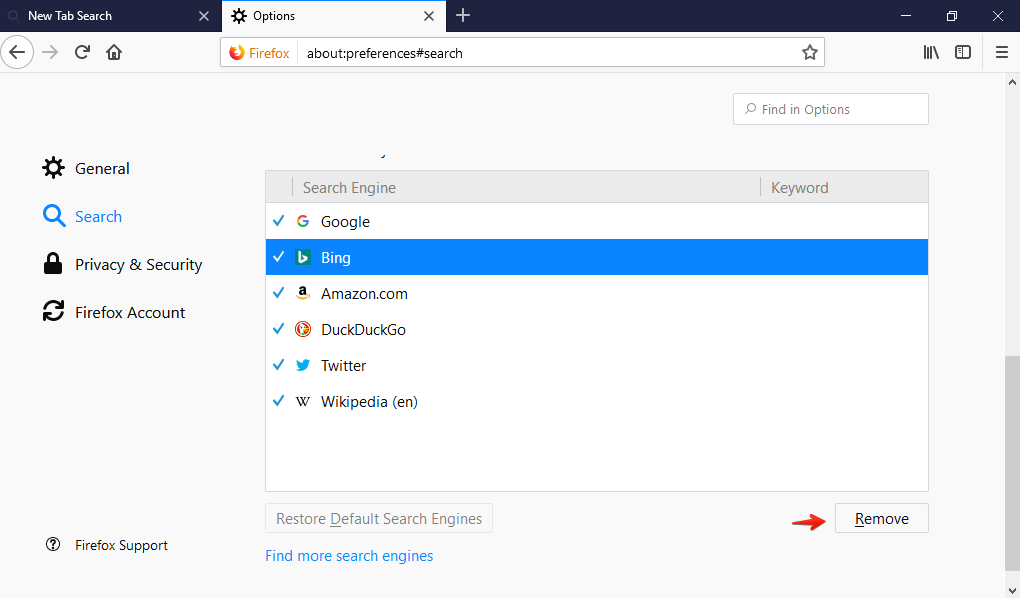
Instructions to repair Internet Explorer home page and search engine settings manually.
- In Internet Explorer, click on its settings menu in the form of a gear-wheel, then select “Internet Options“:
- Click on the “General” tab, then check home page settings. Remove unwanted home page from the field, or click on “Use new tab“. Click on “Apply” to save changes:
- In Internet Explorer, click on its settings menu in the form of a gear-wheel, then select “Manage add-ons“:
- Click on “Search Providers“, then select unwanted search engine and click on “Remove” button related to it:
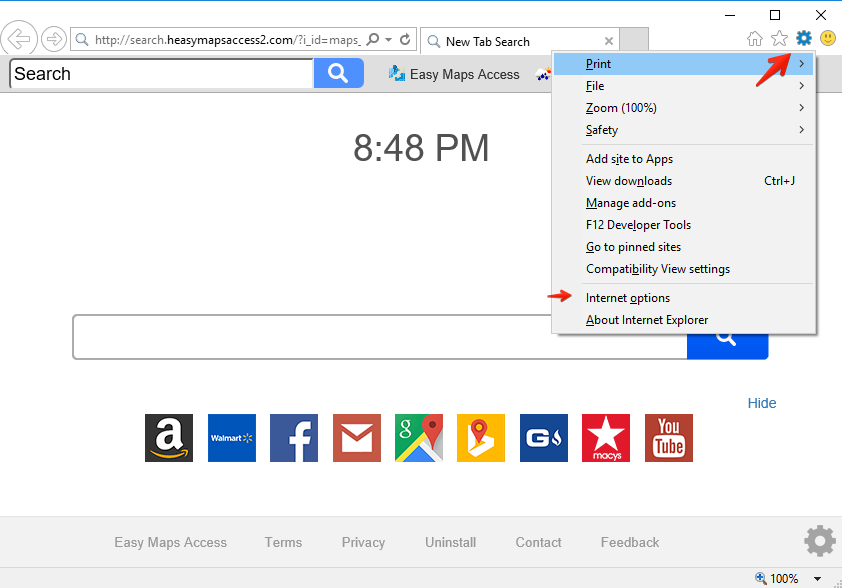
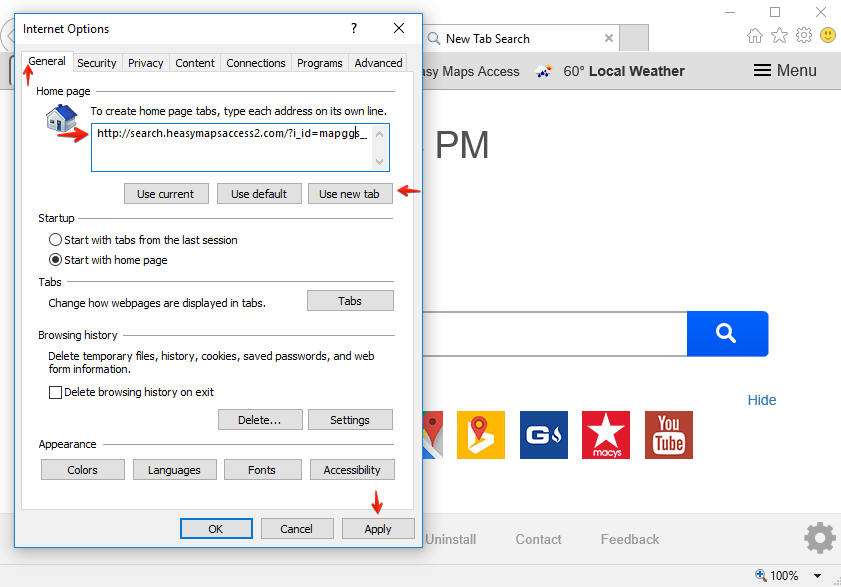
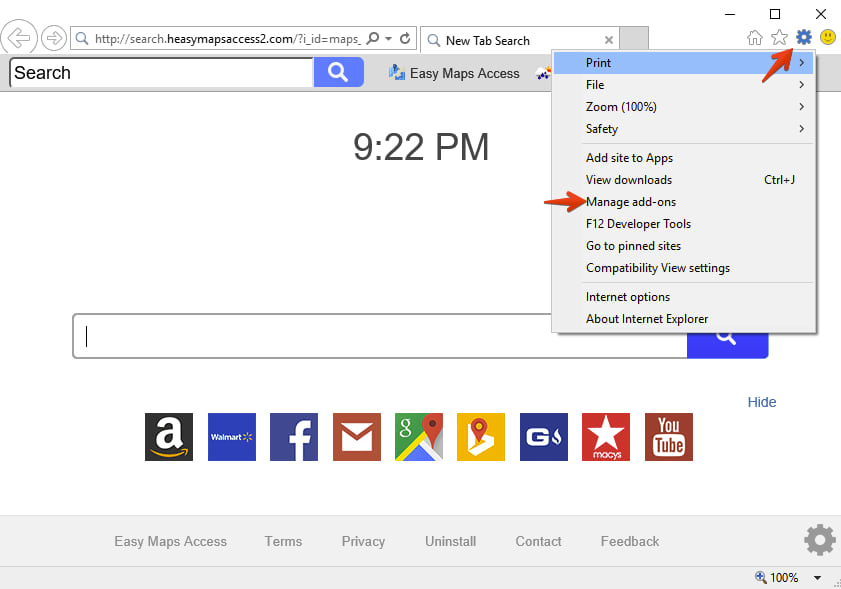
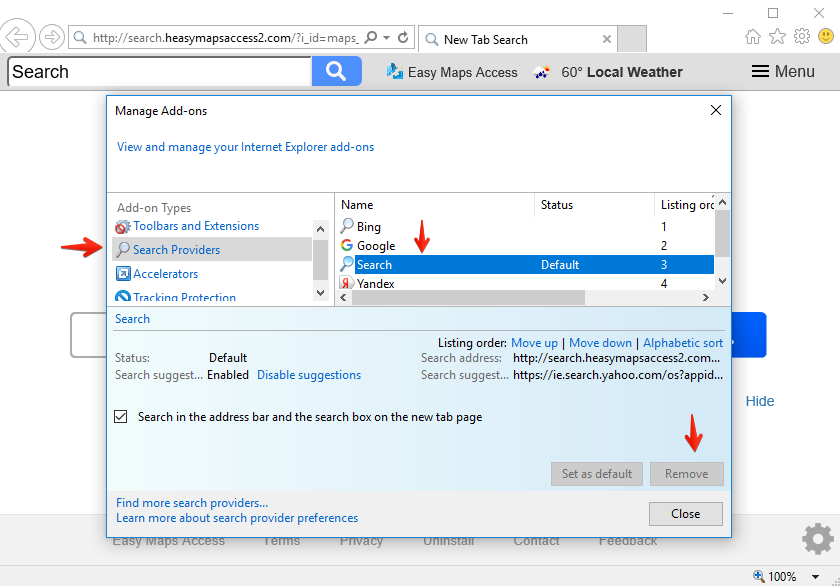
Instructions to change Opera home page and search engine settings manually.
- Click on Opera menu in the form of “Opera” button, then select “Settings“:
- Click on “Browser” section, then select “Set pages“:
- Find unwanted start page of Opera, then click on “X” next to it to remove it:
- In the “Search” section, click on “Manage search engines…“:
- Click on “Make default” to select your preferred default search engine, then click on “Done“:
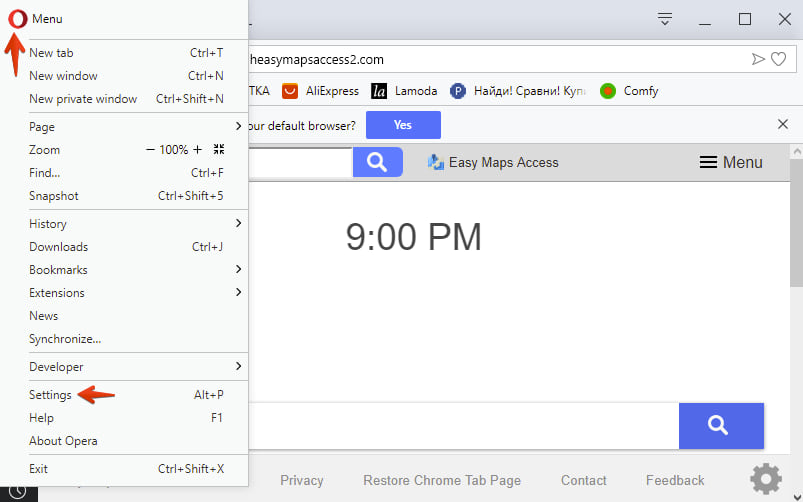
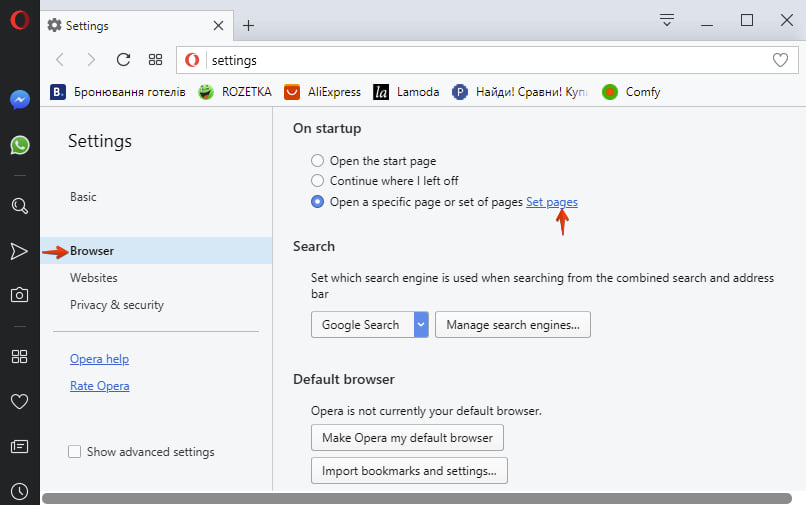
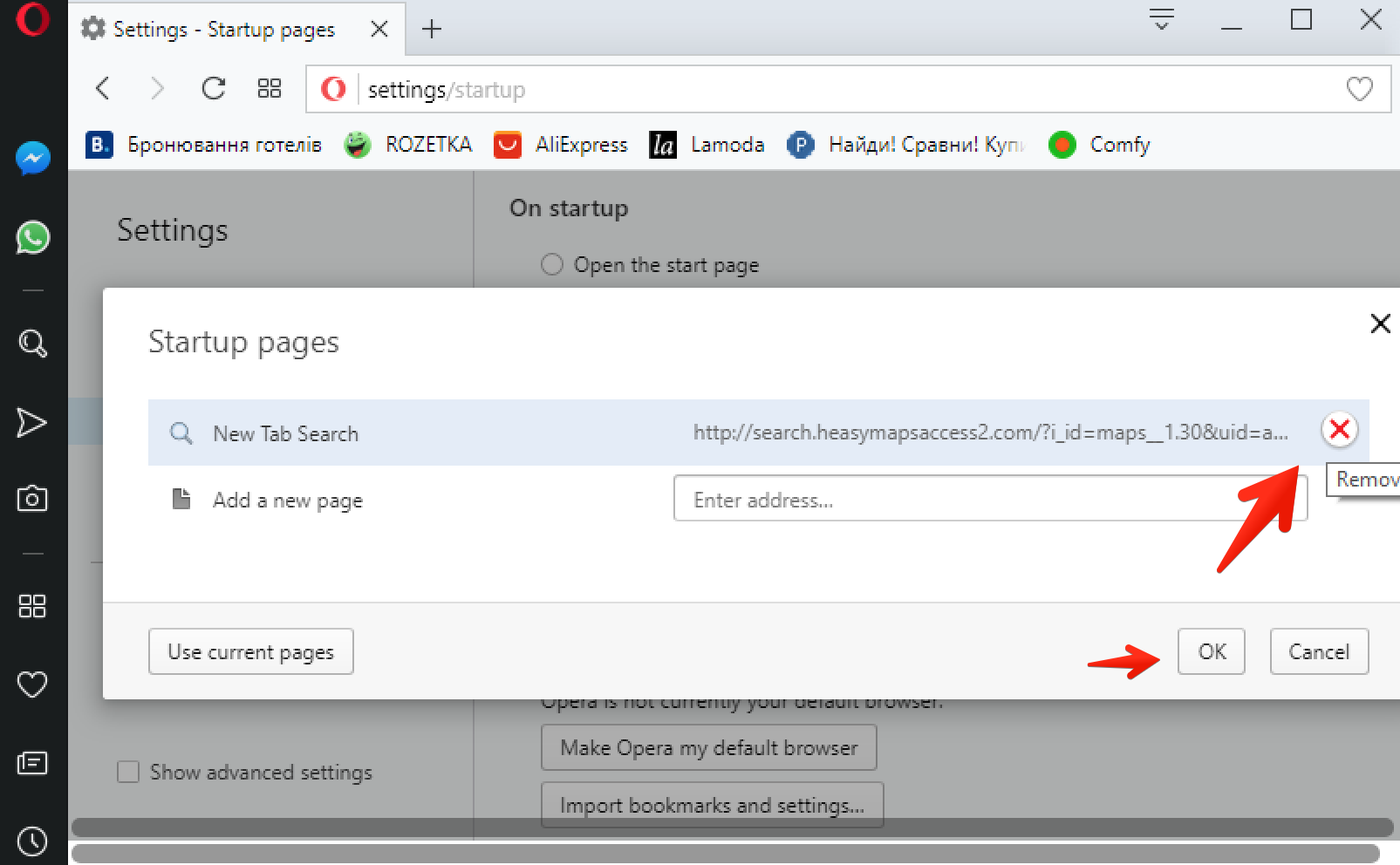
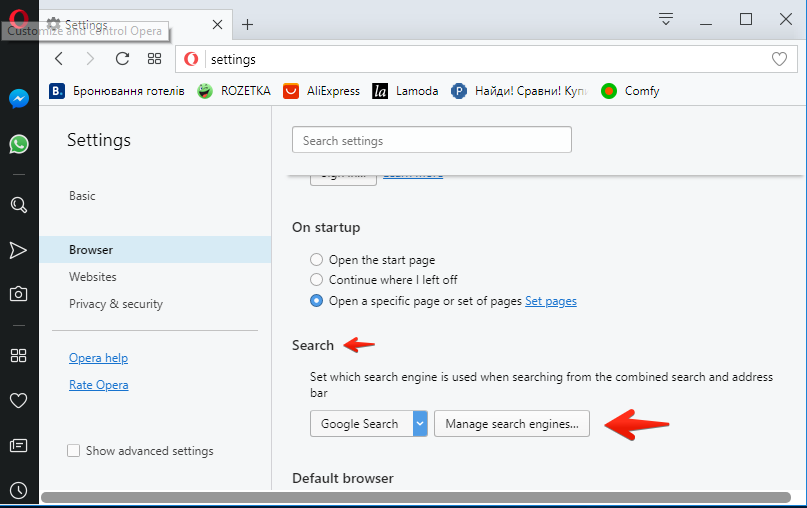
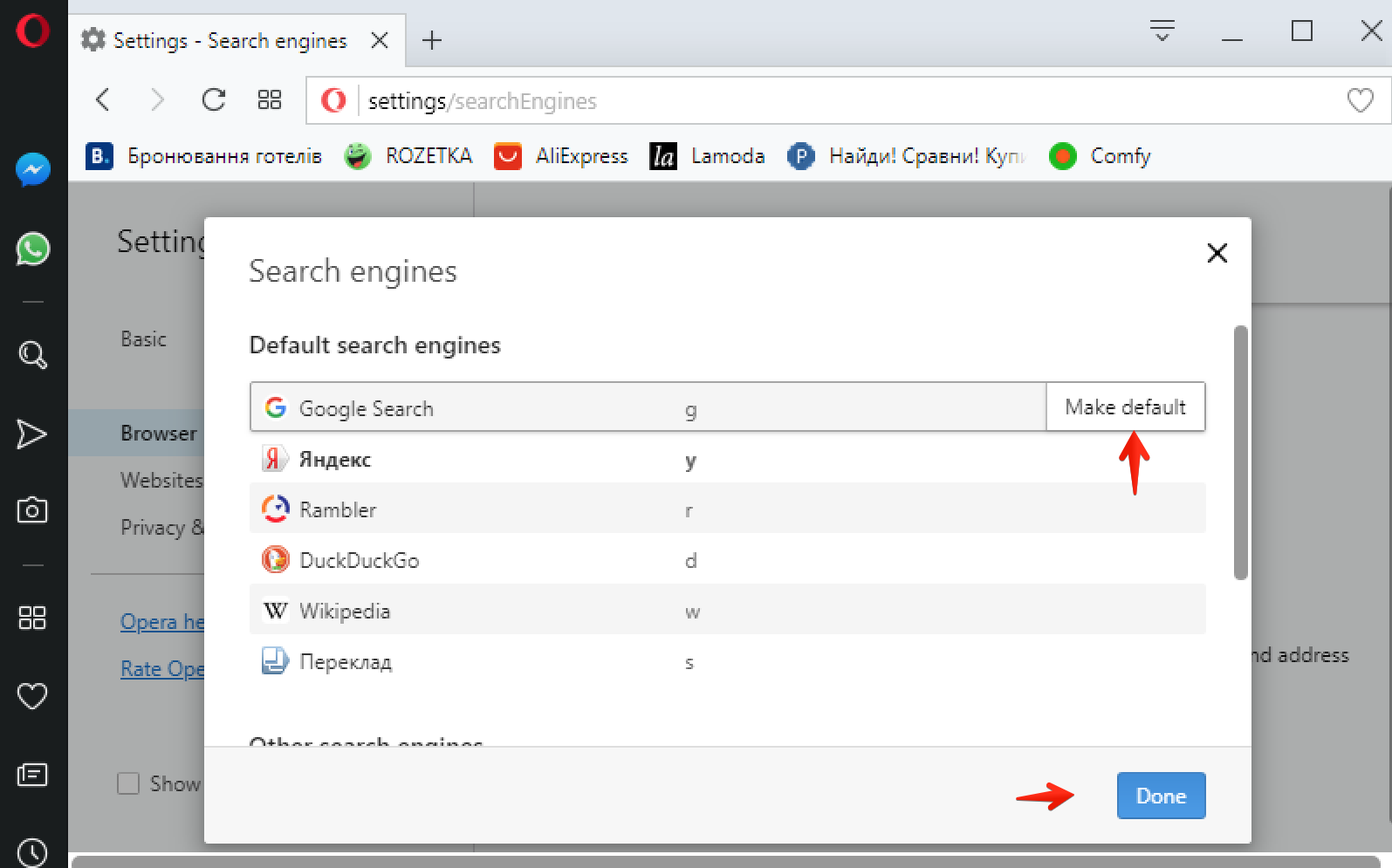
STEP 3. Removing unwanted extensions from browsers.
Deleting unwanted extensions from Google Chrome.
- Click on Google Chrome menu in the form of three vertical dots, then select “Settings“:
- Click on “Settings” in the left menu (in the form of three horizontal lines), then select “Extensions“:
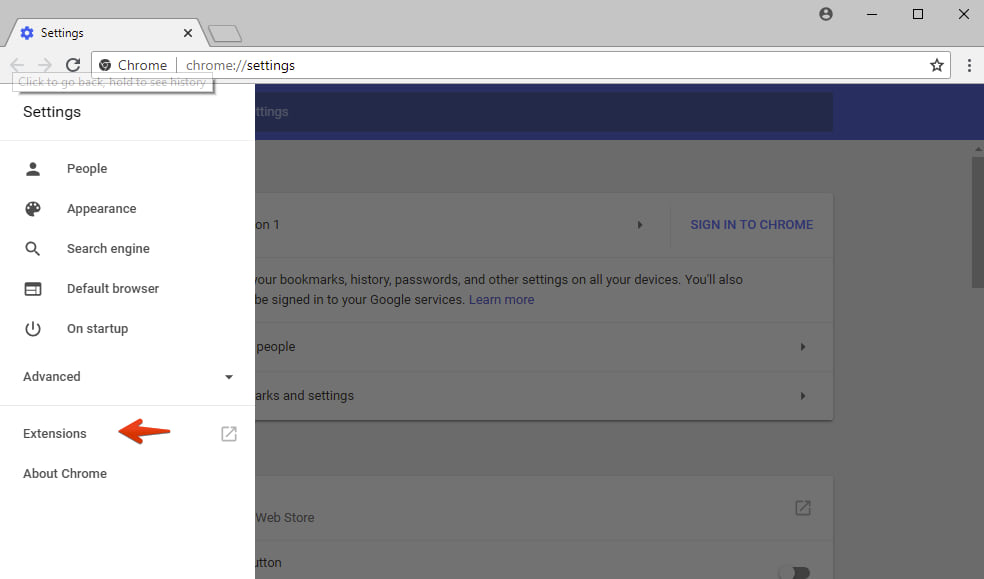
Google Chrome extensions - Find unwanted extension, then click on “Remove” button next to it:

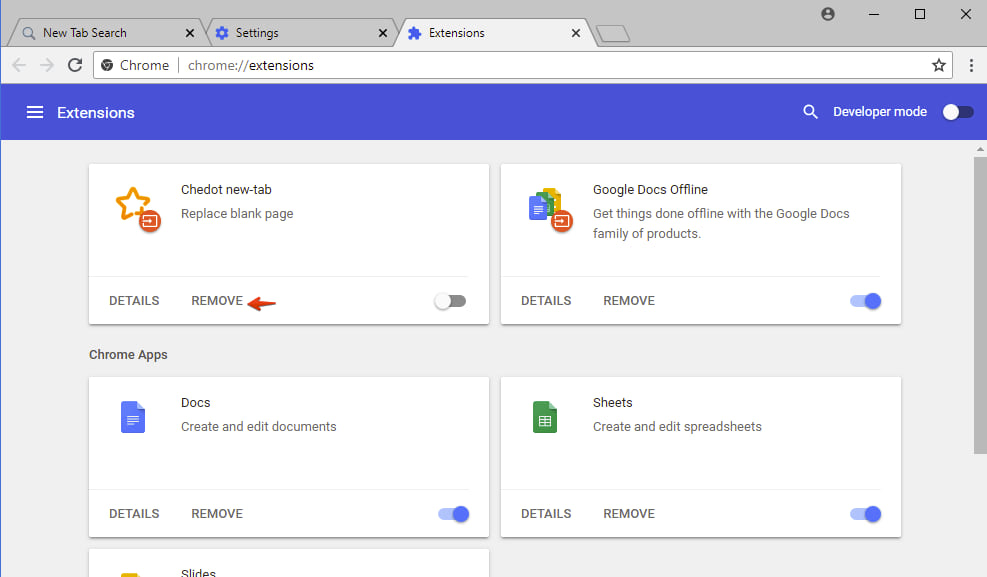
Removing unwanted add-ons from Mozilla Firefox.
- In Mozilla Firefox, click on its menu in the form of three horizontal lines, then select “Add-ons“:
- Click on the “Extensions” item. If you see suspicious add-ons, disable and then delete them:
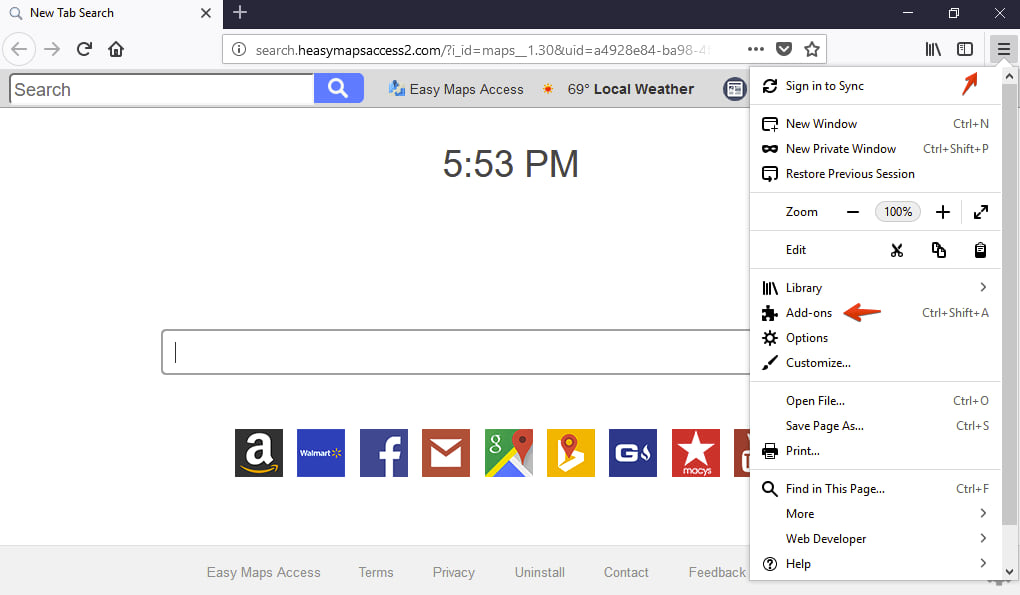
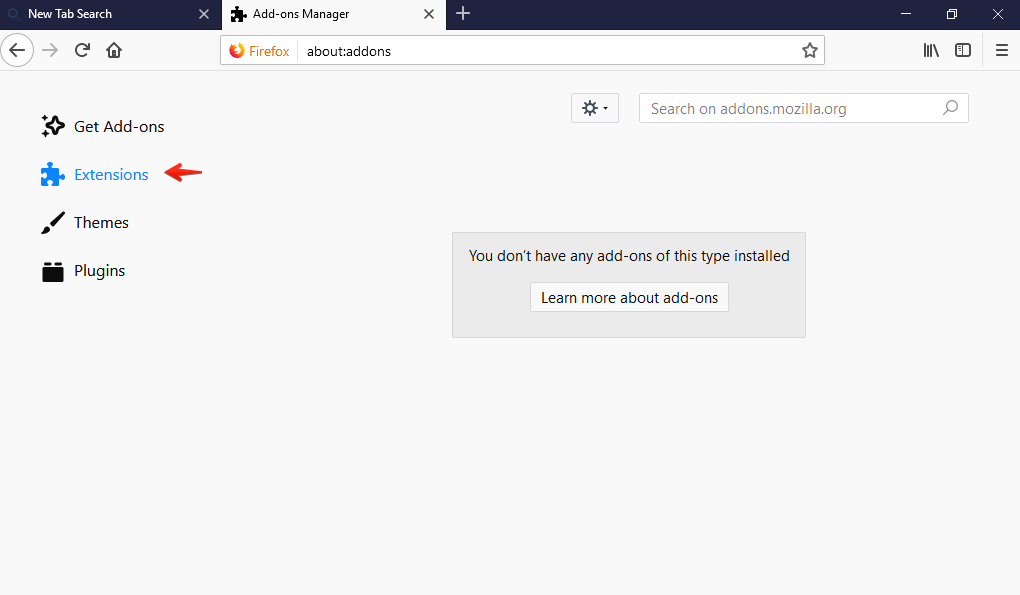
Getting rid of unwanted addons from Internet Explorer.
- In Internet Explorer, click on its settings menu in the form of a gear-wheel, then select “Manage add-ons“:
- In the section called “Toolbars and Extensions“, find specific unwanted add-on, then click on “Disable” button related to it:
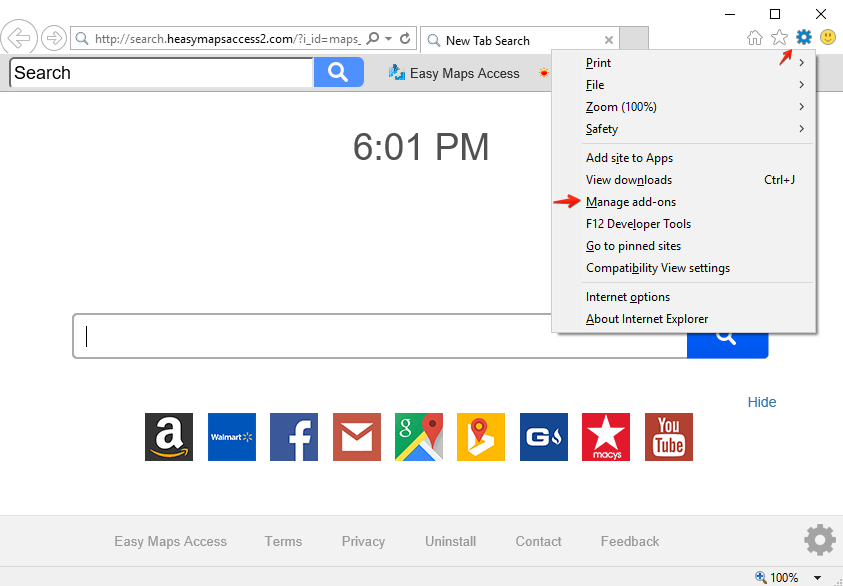
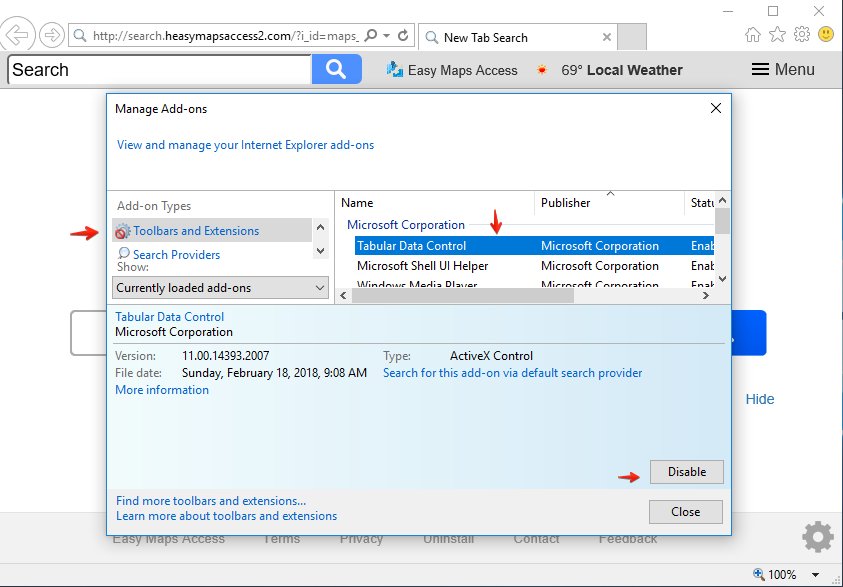
Cleaning unwanted extensions from Opera.
- Click on Opera menu in the form of “Opera” button, then select “Extensions“:
- Find specific unwanted extension, then click on “Disable” button associated with it:
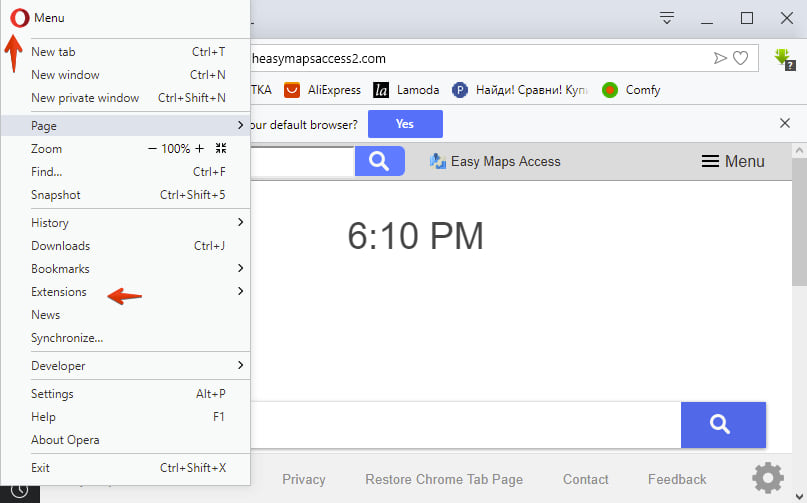
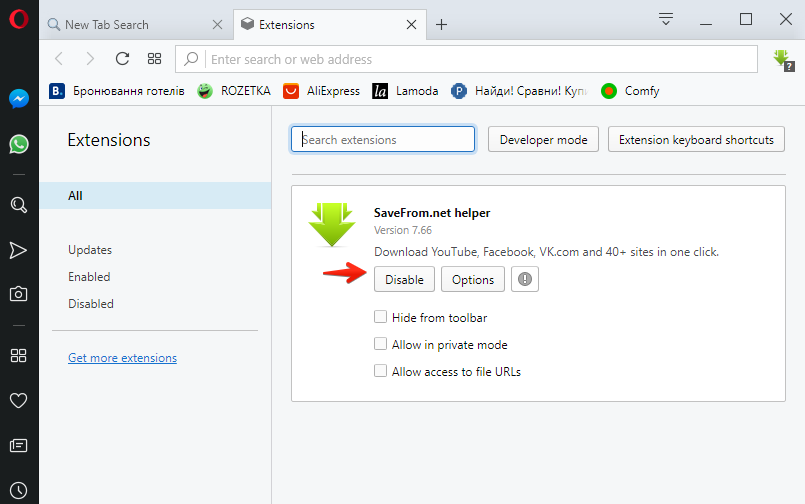
STEP 4. Disabling push notifications from browsers.
Disabling push notifications from Google Chrome.
- Click on Google Chrome menu in the form of three vertical dots, then select “Settings“:
- Scroll down to the bottom of the page, then click on “Advanced“:
- In “Privacy and Security” section, click on “Content Settings“:
- Click on “Notifications“:
- Find specific site that is displaying unwanted push notifications, click on its options in the form of three vertical dots, then click on “Remove“:

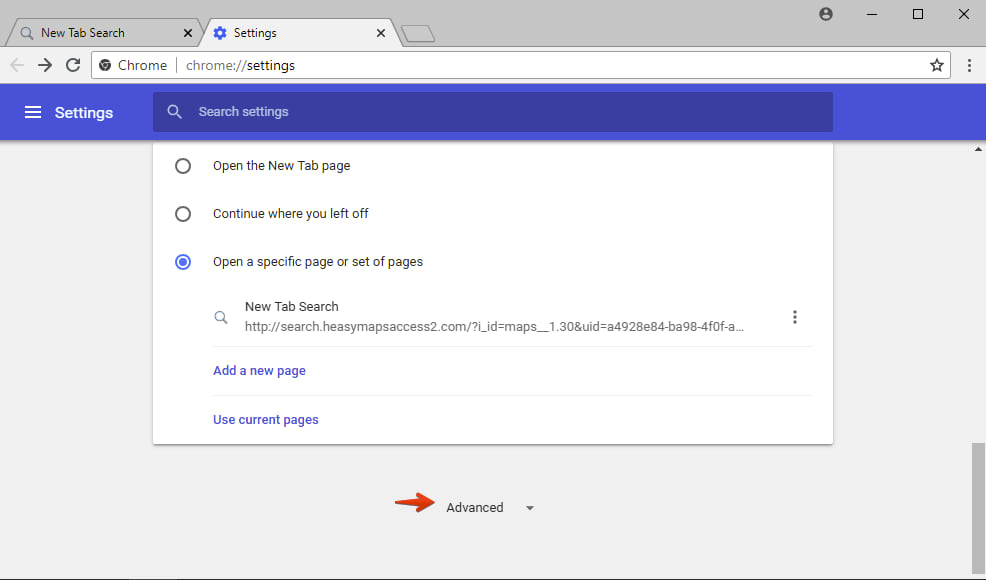
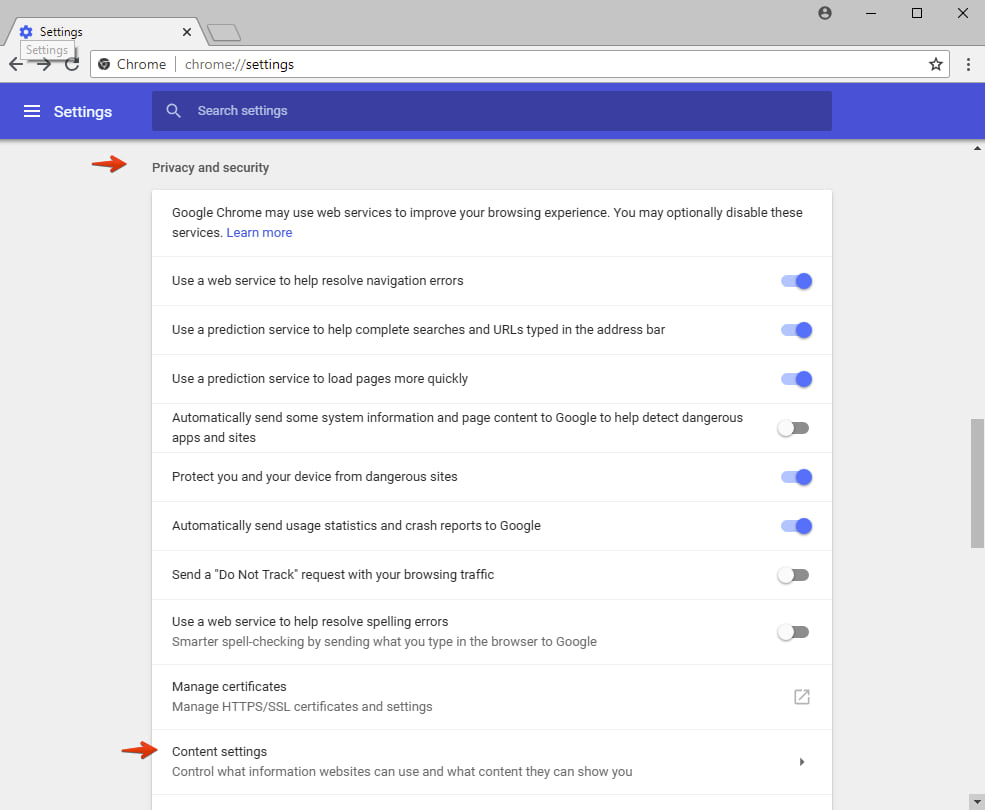
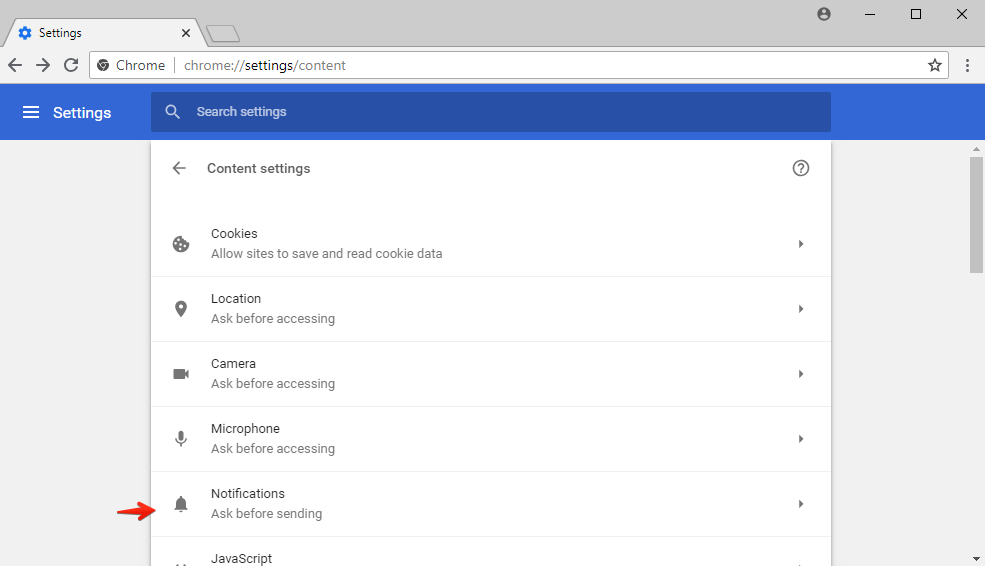
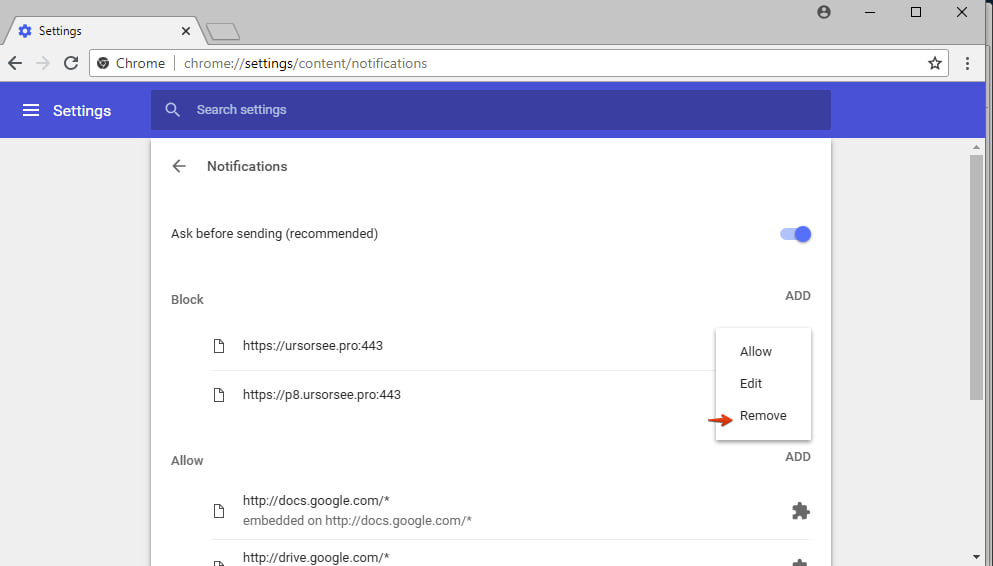
Disabling push notifications from Mozilla Firefox.
- In Mozilla Firefox, click on its menu in the form of three horizontal lines, then select “Options“:
- Scroll down to “Privacy & Security” section, then find “Notifications“, click on “Settings” button related to it:
- Find unwanted sites that keep displaying unwanted notifications, then change the status from “Allow” to “Block“. Additionally, check the box “Block new requests asking to allow notifications“. Then click on “Save changes“:

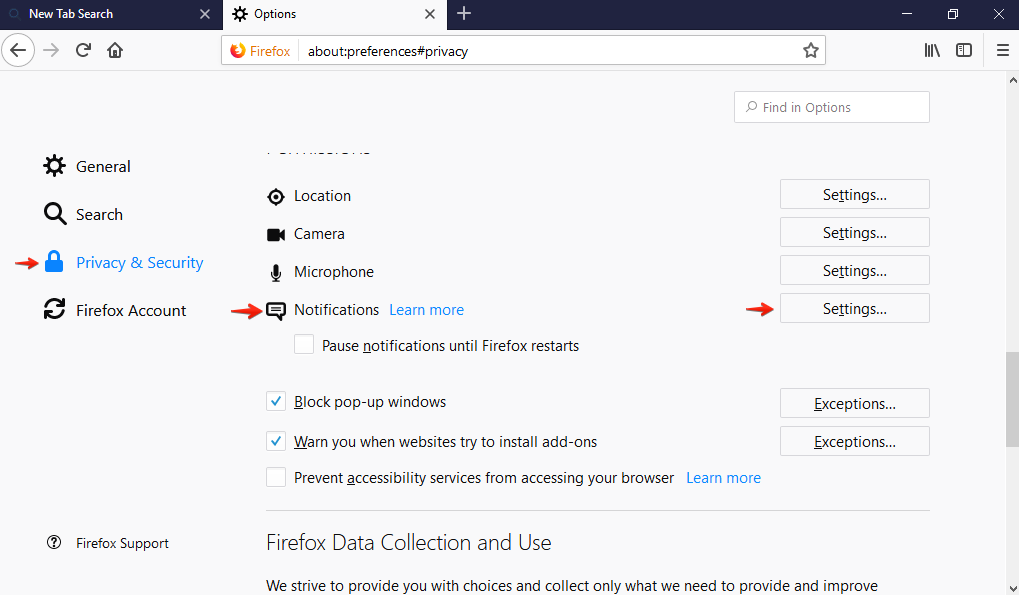
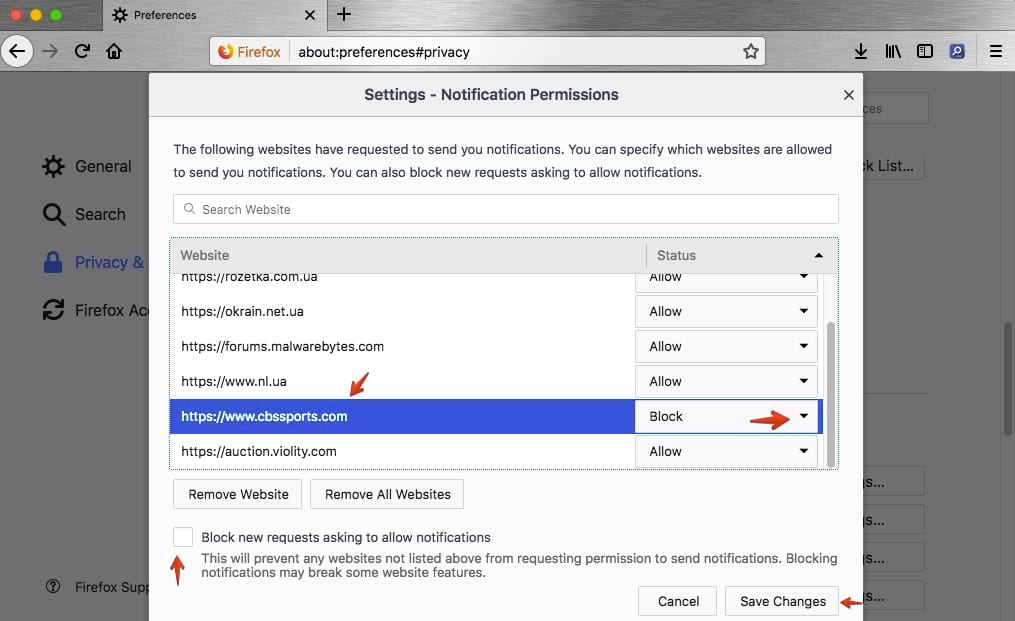
STEP 5. Full reset of browsers either manually or automatically (video guides).
Important notice! Trying to fix your browsers manually after malware attack is definitely not easy, requires more skills and time, even with detailed description as above. We recommend you to try our absolutely free feature provided by GridinSoft Anti-Malware to reset your browsers automatically within just a couple of mouse clicks!

